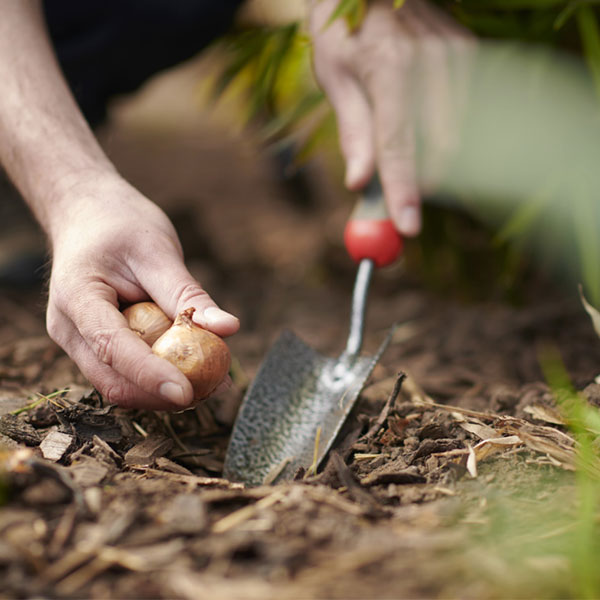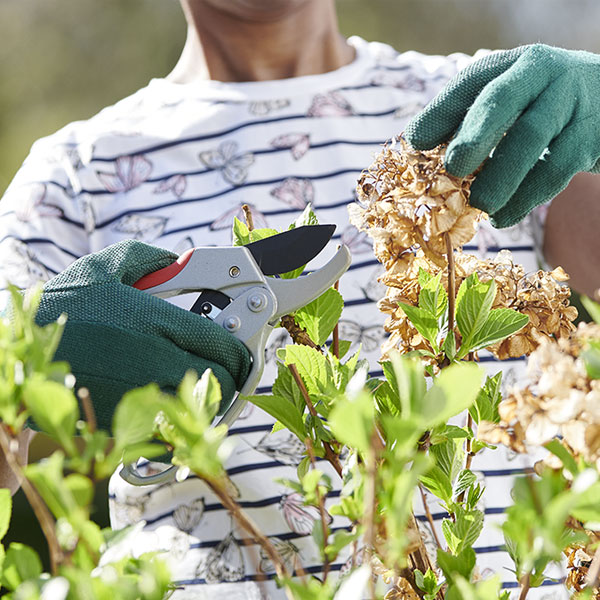A guide to gardening tools
Whether you’ve just discovered the art of gardening or you’re a green-fingered enthusiast, one thing’s for sure – having the right gardening tools will help you get the job done quickly and efficiently.
With so many different types of garden tools available, it can be difficult to know where to start. So, to make sure you’re using the right tools for the job, we’ve put together this handy garden guide which features all the essential garden tools you could ever need!
 By Sarah
By Sarah- 5th May 2021
- 5min read
This blog was updated on 4th December 2025
Garden hand tools
When you're getting stuck in with the gardening, having some tried-and-tested hand tools nearby is a must! They're lightweight, easy to store, and will make your time in the garden so much easier. Here are our favourites:
Garden trowels
A selection of different trowels can help you transfer plants and dig small holes for new ones. However, if you’re working with very young plants, it’s a good idea to opt for a transplanter, which is a specialist trowel with a narrower head. Some will even come with gauges, which help you plant everything to their required level.
Hand forks
A hand fork usually has 2 or 3 metal prongs which is perfect for getting to grips with stubborn weeds, especially in smaller areas or in and around shrubs. You can also use it to break up compacted soil.

Digging tools
Whether you're digging holes for plants, ferrying soil & compost from one place to another, or harvesting root veg, digging into the ground calls for specialist tools!
Shovels & spades
As one of the most basic garden tools, spades and shovels are a must-have for removing or digging up earth. However, it’s important not to confuse the two! A garden shovel has a broad base, which is designed for moving loose materials around, e.g. snow or earth, and will normally have upturned sides to help with the ‘shovelling’ function. In contrast, a spade tends to have a sharp, flat cutting edge, which makes them the ultimate digging tool.
The height of the spade is important, as you’ll want to find one that's the most comfortable for you. Most spades are 72cm (28in) in height, but longer ones are available if you’re taller. And don’t forget the handle design too – available in T or D shapes, choose an ergonomic design that you can work with for long periods of time.
Garden forks
A garden fork is a fantastic digging tool, helping to get even the most stubborn plants out of the soil. They're perfect for harvesting potatoes, breaking up compacted soil, or incorporating compost or manure into your beds. With garden forks, don’t forget about finding the right height and handle to minimise the strain you’re putting on your back and hands.
Cultivators
This is another handheld garden tool you might find useful. With 3 prongs and a compact design, cultivators are ideal for using in borders and beds where you need to loosen or break up the soil. Equally, if you’ve got some weeds that need removing from densely planted areas of your garden, the design makes it easy to do this too!
Garden rakes, hoes & weeders
Everyone loves a tidy garden, right? Wrong. Mother nature loves a challenge, and will do everything she can do cover your garden in leaves and bombard your beds with weeds.
Though a bit of natural chaos in the garden is a good thing (you can read more about how beneficial it is for wildlife in our blog here), we have the tools you need to keep your garden tidy as best you can.
Garden rakes
There are a number of different types of rake available, so it’s important to get the best one for the job. For example, rakes with flexible teeth are lawn rakes, which can be used to remove grass clippings, moss and leaves from your lawn. For removing heavier debris, levelling soil or preparing seed beds, opt for a rake with solid teeth.
Garden hoes
Hoes are perfect for weeding large areas, and they also manoeuvre and loosen the earth. To get the best garden hoe, you’ll need to choose between the two different types – a push or pull hoe.
A pull hoe has a blade that’s at a right angle, and to use it you make a chopping action in the soil before pulling the hoe back through it. It’s designed to remove weeds from the top of soil, while also loosening the earth, however it isn’t the best weeding tool if you want to remove deep-rooted weeds.
To get rid of stubborn weeds and to cultivate the soil, opt for a push hoe (also known as a Dutch hoe). This has a blade that’s at a gentler angle from the handle, looking more like a spade. All you need to do is push it through the soil in a forward motion, driving it below the surface layer.
For targeted weeding, there are loads of weeders to choose from including claw weeders for plants with deep tap roots (such as dandelions), patio weeders, and much more. These will all help you with larger weeds, while hoes are more of a blanket solution for smaller weeds.

Pruning and cutting tools
In order to keep your garden in tip-top condition, you’ll want to trim and tidy by using pruning and cutting tools. From trimming hedges to sawing branches, here’s what you need:
Garden secateurs
For cutting and pruning wood up to 1cm (1/2 inch) thick, secateurs are ideal. As they’re easier to use than a garden knife, they make light work of taking cuttings or trimming smaller shrubs and hedges.
There are a few different types of garden secateurs, including bypass, anvil and ratchet pruners. Bypass pruners have two curved blades that take on the form of scissors, ‘bypassing’ each other as you make the cuttings. These help make a smooth, precise cut, which is why they’re the best secateurs for thin branches and small stems.
Anvil pruners have a single straight blade and are best used for medium-size branches and dead wood. They aren’t suitable for delicate stems as the flat blade tends to crush them. Ratchet pruners are the same as anvil pruners but come complete with a ratcheting mechanism, which helps you get through heavier branches or stems and thick dead wood.
Garden loppers
Loppers follow a very similar design to secateurs and are also available in bypass, anvil and ratchet styles. However, to provide you with extra leverage they have extended handles. The largest loppers will be able to cut branches that have a diameter of up to 5cm (2 inches).
If your garden has a lot of tall trees, you might want to invest in a pair of loppers with an extended or telescopic handle. And if you have to contend with branches thicker than 5cm, opt for a pruning saw or bow saws. These should also be compact enough to get in between the branches!
Garden shears and knives
A pair of pruning shears is ideal for keeping a hedge in shape. The best garden shears will have ergonomic handles for added comfort as well as hard-wearing blades, which can be stainless steel, aluminium or titanium coated, for example. You can also get grass shears which are perfect for achieving a precise lawn edge. And unlike a strimmer, they won’t damage tree bark or shrubs.
And for taking cuttings, pruning and doing general jobs such as cutting string and opening compost bags, a gardening knife is another useful garden tool.
Other useful tools for gardening
Wheelbarrows
Every garden needs a wheelbarrow that’s waiting on standby. They’re a lifesaver when it comes to transporting things around the garden, and because they tip up they’re easy for unloading. However, you will need to master the art of using a wheelbarrow – if you get your balance wrong you might end up tipping everything over the lawn!
Lawnmowers
There’s nothing quite like a freshly cut lawn! Whatever size garden you have we’ve got a range of lawnmowers to help you keep on top of the grass cutting.
A lightweight hover mower is ideal if you have a small to medium-sized garden and it has the advantage of being easy to manoeuvre. Traditional rotary blade lawnmowers are a great choice for any size lawn and they can handle large areas of grass.
If you want the ultimate in modern gardening tech you could go for an advanced robotic lawnmower. Just sit back and watch while it does all the work!
Gloves
Although not a ‘garden tool’ as such, gardening gloves are another must-have when you’re getting your hands dirty in the garden. They’re not for everyone, though, as some love the bittersweet feeling of blisters, dirty fingernails and splinters after a hard day’s graft in the garden! But they are a must when you’re dealing with chemicals and other substances.
As well as the above, you might want to kit out your garden shed with the following:
- Watering can – an essential for keeping your plants hydrated
- Kids’ gardening tools – because little hands love to get dirty!
- Brush – for when you make a mess because you’ve been a bit over zealous with your digging
- Garden bags – stronger than standard bin bags, they’re ideal for tidying away rubbish
- Compost bin - for turning food waste & plant matter into rich compost for your plants
You can shop our full garden tools range online. Happy gardening!
Get in touch with us on Facebook, Instagram, TikTok & X.